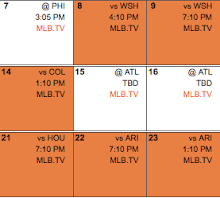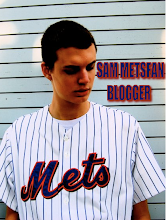Before this weekend, Citi Field had known nothing of the Mets’ once-fierce rivalry with the Atlanta Braves. Sure, the Mets and the Braves had played here before 12 times (with the visitors winning seven of them). But those games were not like the teams’ games from a decade ago, when the National League East was at stake and emotions ran high. When the first-place Braves began a three-game series with the second-place Mets on Friday, those emotions were back, even if the names on most of the jerseys had changed. But what began as a pitchers’ duel of the vintage seen in this rivalry’s turn-of-the-millennium heyday eventually unraveled into a 4-2 win for the Braves. The Mets could not be too upset with their starter, R. A. Dickey, for not delivering them a win. After all, for the Mets to have a realistic chance at the division title this year, they had to hope that a generally unremarkable starter like the 35-year-old Dickey would turn into an unlikely back-of-the-rotation stalwart. And that is exactly what happened. But on this night, Dickey (6-2) stayed in too long, and the last two batters he faced gave the Braves a victory. The score was tied, 2-2, in the top of the seventh inning, and Dickey appeared one out away from his eighth quality start in 10 outings. But then Melky Cabrera hit a home run to right field, and Omar Infante followed with his own blast over the left-field fence. They were unlikely torpedoes into Dickey’s otherwise buoyant outing; Cabrera and Infante had hit only a combined three home runs the entire season. In this game, though, they put together more offense than the entire Mets’ lineup. Hitting second and third for the Braves, they had seven hits in 10 at-bats and scored all four of the team’s runs. The Mets found no such performances from their hitters. Against the right-hander Tommy Hanson, the Mets struggled to get hits when they needed then. They left six men in scoring position with two outs. Dickey, of all people, ended up being the Mets’ best offensive option, singling in both his at-bats and scoring both times. Hanson allowed two earned runs in five and two-thirds innings; he gave up seven hits while striking out six and walking one. Dickey pitched one inning longer. He left the game charged with four runs, three of them earned, on nine hits, two walks and six strikeouts. Until the Braves’ timely home runs, the two teams had clawed each other for hard-fought runs, one at a time, with the Braves taking a one-run lead and then the Mets erasing it. In the first, the Braves scored off a two-out ground ball that was booted by Jose Reyes; two innings later, the Mets drew even on a sacrifice fly by David Wright. In the fifth, Troy Glaus singled to put the Braves up by a run, but again the Mets came back when Reyes hit a two-out double over the head of Braves left fielder Eric Hinske. Reyes’s hit was one bit of good news in an evening that was otherwise less than satisfying. He is still hobbled by a sore oblique muscle and can only hit from the right side of the plate. The team sent him for a magnetic resonance imaging test earlier Friday as a precaution. In light of Reyes’s ailment, Manager Jerry Manuel put him in the second spot in the lineup for the first time since 2005. He noted that Reyes would probably be at a disadvantage against right-handed pitchers like Hanson, against whom the switch-hitting Reyes typically hits left-handed. Reyes’s weakness seemed apparent in the first inning, when he flailed helplessly at an outside pitch for an embarrassing strikeout. But his double — a smoking line drive that seemed to fool Hinske — was anything but embarrassing.
Friday, July 9, 2010
Subscribe to:
Post Comments (Atom)









No comments:
Post a Comment